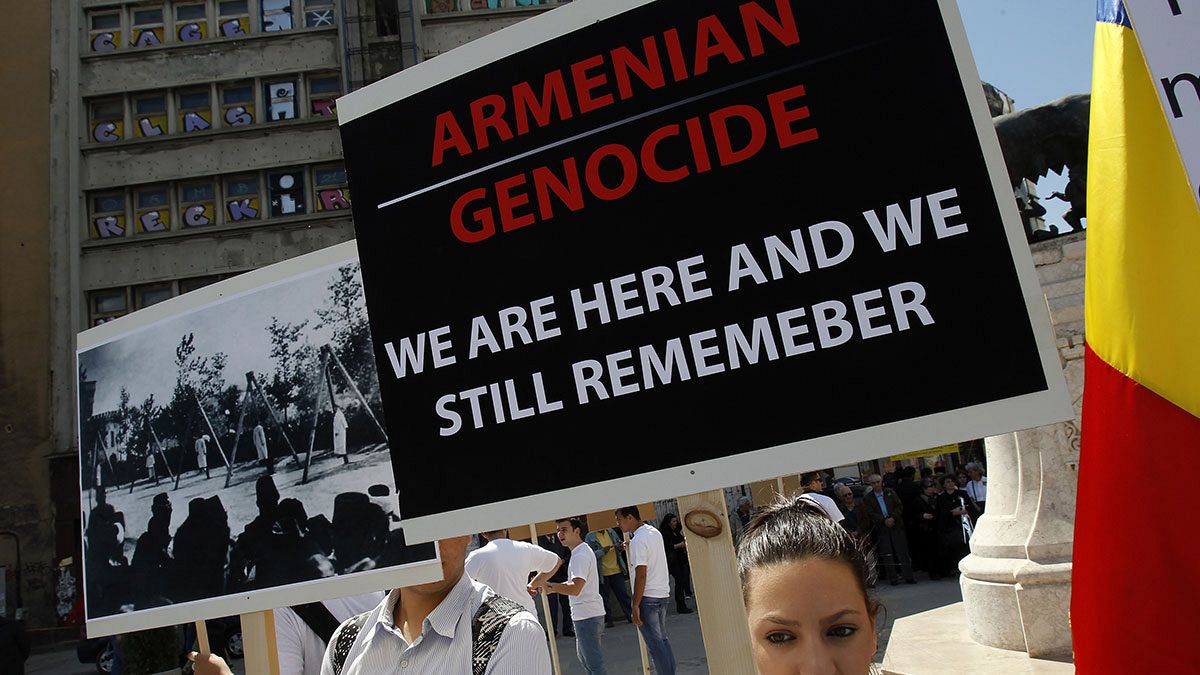This article sets out how Armenians generally view the context, events and implications of the massacres of ethnic Armenians living in the Ottoman Empire during World War I. Turkey disputes key parts of the information and you canread the Turkish perspective here.
The extermination of Armenians in the Ottoman Empire and the surrounding regions during 1915-1923 was masterminded and perpetrated by the government of Young Turks, according to the Armenian account which has been backed by the European Parliament and a number of national governments.
The First World War is seen as giving the Young Turks, who held power, the opportunity to settle accounts with Armenians living in the Ottoman Empire. A number of top ministers and officials are implicated.
Armenia and Armenians had been seen as an obstacle to the project of the Yong Turks of building a “Great Turan” stretching from the Bosphorus to Altai. During the First World War massacres of Assyrians, Greeks and Arabs living in the Ottoman Empire also took place.
In February 1915 the military minister Enver Pasha ordered the elimination of Armenian soldiers serving in the Army, according to Armenian groups. On April 24 and the following days 800 Armenians were arrested in Constantinople and exiled to the depths of Anatolia. Armenian writers, journalists, doctors, scientists, clergymen, intellectuals including Armenian members of the parliament were among them. A part of them died on the way of the exile, while others died after reaching there.
The first international response to the violence resulted in a joint statement by France, Russia and the Great Britain in May 1915, where the Turkish atrocities against the Armenians were defined as “a crime against humanity and civilization”. According to them, Turkish government was responsible for the implementation of the crime.
There were an estimated two million Armenians living in the Ottoman Empire before the WWI. Approximately one and a half million Armenians were killed from 1915 to 1923, a figure disputed by Turkey.
Raphael Lemkin was explicitly moved by the Armenian annihilation to coin the word genocide in 1943 and define systematic and premeditated exterminations within legal parameters. The Armenian massacres are acknowledged as genocide by a number of countries and international organisations, because scholars point to the organised manner in which the killings were carried out in order to eliminate the Armenians.
The 100th anniversary of the Armenian Genocide was commemorated on April 24, 2015 in Armenia and other countries. The presidents of Russia, Vladimir Putin and France, François Hollande, joined other leaders at ceremonies commemorating the centenary at the Tsitsernakaberd memorial complex in Yerevan, Armenia.
Among the most important recognitions on the occasion came from the Pope and the German president.
Pope Francis during a Vatican Mass dedicated to the 100th anniversary of the tragedy described the massacres of 1.5 million Armenians in Ottoman Turkey as “the first Genocide of the 20th century”. The Pope remembered the victims of “that immense and senseless slaughter” at the start of the Mass at St. Peter’s basilica, which was attended by President Serzh Sarkisian, the supreme heads of the Armenian Apostolic Churches and hundreds of Armenian Catholics.
Germany also condemned the massacre of 1.5 million Armenians by Ottoman forces as a “genocide”, President Joachim Gauck said during a church service commemorating the centenary at the Cathedral of Berlin, adding that Germany bore partial blame for the bloodletting. Gauck’s speech marked the first time that Berlin has officially used the word “genocide” to describe the killings in Armenia, and an unusually strong acknowledgement of the then German empire’s role.
You can find out about the Turkish perspective on the massacres here.
